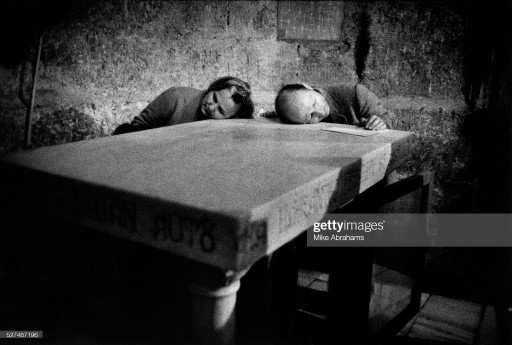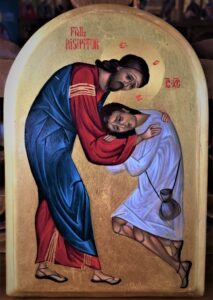A faithful woman, who recently returned from a pilgrimage to Jerusalem, recounted that she visited a place that houses “part of the granite pillar which was originally at the Praetorium” (called the “Chapel of the Crown of Thorns” – the second one here: https://en.jerusalem-patriarchate.info/the-holy-sepulcher-and-the-all-holy-church-of-the-resurrection/the-chapels/), “where it is said that if you bend your ear, you can hear the hammering of the nails.” When she bent her ear the first time, she didn’t hear anything. The second time, however, although very faintly, she heard the “hammering of the nails” and was shaken to her core. Tears flooded her instantly…
https://www.youtube.com/watch?v=Ip8RksvR1uQ

All of the Gospels that are prescribed for weekdays in this period leading up to Great Lent are about the Passion of our Lord (taken from the accounts of Saints Mark and Luke). Almost as if to tell us what Great Lent really is: a “straining” of our body so that our heart might “hear” the significance of the events on Golgotha. So, maybe we won’t hear anything the first time, or the second time, or even the third time, but at least during Holy Week we might “hear” something that strikes us to the depth of our heart, just like the rocks were split and all of creation trembled at the Crucifixion.
Let us not exclude the possibility that the “hammering of the nails” be the way in which our Lord “knocks” at the door of our closed (and hardened) hearts…
 In one of the aforementioned Gospels, our Lord entreats us: “Watch therefore, and pray always that you may have strength” (Luke 21:36). At Putna Monastery, a very beautiful practice is followed. In the first week of Great Lent, many faithful (especially women) come to the monastery to live like the monks: they fast (neither eating nor drinking anything from Sunday evening until Wednesday evening, and then once a day, without oil, after sunset), pray, and attend church services. And they strive to read the entire Psalter each day (some of the women manage even more than one per day). In this manner, they “gain strength” and make a good start to Lent…
In one of the aforementioned Gospels, our Lord entreats us: “Watch therefore, and pray always that you may have strength” (Luke 21:36). At Putna Monastery, a very beautiful practice is followed. In the first week of Great Lent, many faithful (especially women) come to the monastery to live like the monks: they fast (neither eating nor drinking anything from Sunday evening until Wednesday evening, and then once a day, without oil, after sunset), pray, and attend church services. And they strive to read the entire Psalter each day (some of the women manage even more than one per day). In this manner, they “gain strength” and make a good start to Lent…
Father Arsenie Papacioc depicts for us the spirit in which we ought to bear the asceticism that lies ahead: “If you bear the cross as something dear, not forced – and the cross means to endure that which you’re not quite fond of – it is a symptom of an authentic humility, and thus the Holy Spirit is within you.”
We entreat our good God and His Most Pure Mother that they may give us the strength to fulfill the asceticism of Lent toward our spiritual growth, both our own and that of our loved ones.
In Christ, our Lord and Savior,
Protosinghel Ieremia
Abbot of Saint Dumitru Monastery
PS. The Lenten service schedule of our monastery can be found in the “Liturgical Schedule” section of our website.
